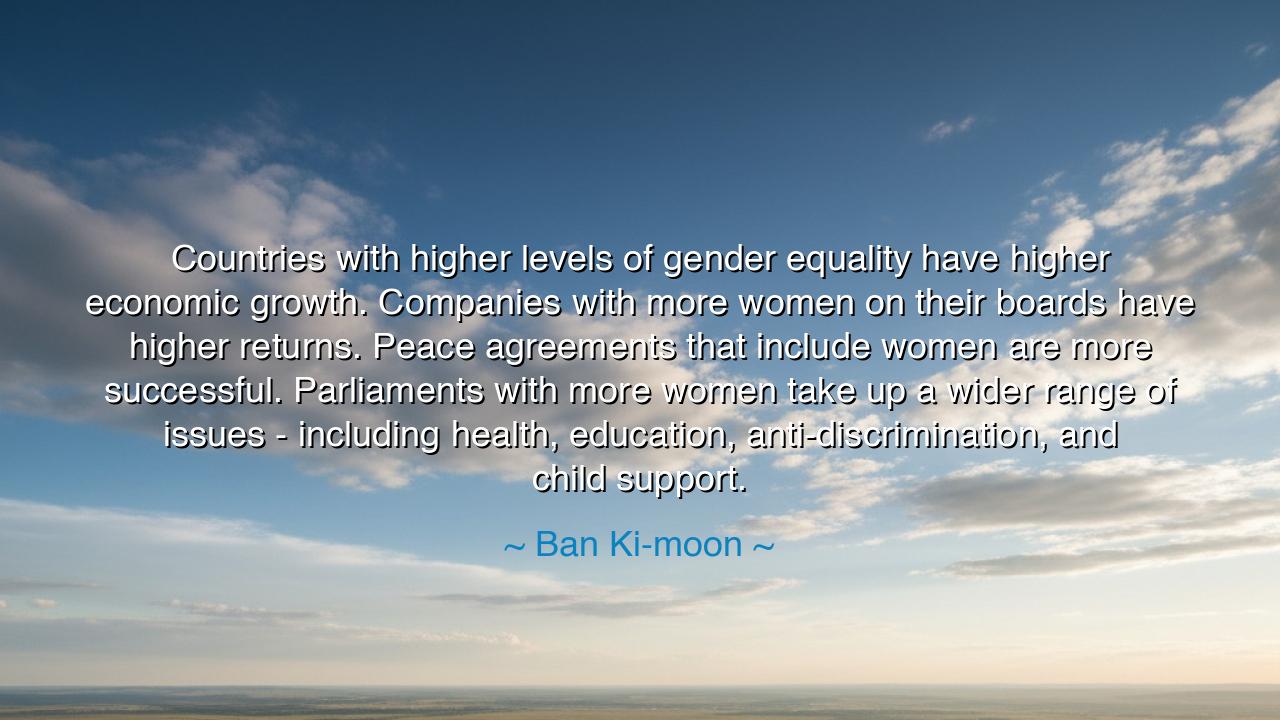
Countries with higher levels of gender equality have higher
Countries with higher levels of gender equality have higher economic growth. Companies with more women on their boards have higher returns. Peace agreements that include women are more successful. Parliaments with more women take up a wider range of issues - including health, education, anti-discrimination, and child support.






In the words of Ban Ki-moon, statesman and servant of humanity, we hear a truth that transcends borders and generations: “Countries with higher levels of gender equality have higher economic growth. Companies with more women on their boards have higher returns. Peace agreements that include women are more successful. Parliaments with more women take up a wider range of issues—including health, education, anti-discrimination, and child support.” This is not merely an observation of data—it is a declaration of moral order. For in these words, Ban Ki-moon unveils a principle as ancient as creation itself: that the world thrives when the feminine and masculine walk side by side, when the wisdom of women is no longer bound but allowed to shape the destiny of nations.
To understand the meaning of this quote, one must first recognize that gender equality is not a gift granted by men to women—it is the restoration of balance long disrupted by history. When Ban Ki-moon speaks of growth, peace, and justice, he does not speak of abstract policies, but of the very heartbeat of civilization. A society that silences half its voice cripples its own wisdom; a nation that blinds itself to the insight of women walks into the future with only one eye open. Thus, his words reveal an eternal truth: equality is not merely fairness—it is power, harmony, and prosperity made visible.
The origin of this understanding lies deep within the story of humanity itself. In the earliest tribes and ancient matrilineal cultures, the feminine was honored as the bringer of life, the keeper of peace, and the voice of reason. The old myths speak of balance—of Isis and Osiris, of Shakti and Shiva—where male and female together sustained the cosmos. But as ages turned and power hardened into patriarchy, the balance was broken. The world grew louder, but not wiser; richer in conquest, but poorer in compassion. Ban Ki-moon, as a leader of the modern world, calls us back to that lost equilibrium—not to erase the masculine, but to uplift the feminine so that both may create together, as they were always meant to.
History itself offers living proof of his words. Consider the nation of Rwanda, once shattered by genocide. In the years after its darkest hour, it became the country with the highest proportion of women in parliament in the world. These women—many survivors of unspeakable loss—did not rebuild through vengeance, but through reconciliation, health care, and education. They proved that peace agreements that include women are indeed more lasting, for they weave healing into justice and empathy into governance. From their leadership rose one of Africa’s most remarkable recoveries—a testament that equality is not an ornament of progress, but its foundation.
Even in the world of commerce and innovation, the truth endures. Studies across continents have revealed that companies with more women on their boards do not simply look better to the public—they perform better. Their profits rise, their decisions are wiser, their cultures more humane. Why? Because diversity is not decoration—it is strength. The feminine voice, with its instinct for connection, care, and long vision, tempers the reckless pursuit of short-term gain. In every sphere—whether the marketplace, the battlefield, or the halls of power—the inclusion of women multiplies wisdom, just as the presence of light multiplies sight.
Ban Ki-moon’s words are not a praise of women alone—they are a reminder to all humankind. For when parliaments include more women, they open their eyes to the full spectrum of life. Issues that were once dismissed as “private”—childcare, education, health, equality—become recognized as pillars of the nation’s strength. The world becomes not only more productive, but more humane. The measure of a nation’s greatness, then, is not in its armies or its wealth, but in its capacity to honor every voice, to make equality the soil from which prosperity and peace may grow.
The lesson is both simple and profound: gender equality is not a distant ideal—it is the key to our collective survival and flourishing. If you are a leader, lift women to places where they can shape the future. If you are a citizen, defend equality not as a political slogan, but as a sacred duty. Teach your sons that strength is not domination, and your daughters that leadership is their birthright. Every workplace, every household, every institution must reflect the balance of creation itself—the partnership of mind and heart, logic and compassion, ambition and care.
Therefore, let Ban Ki-moon’s words ring through the ages as both wisdom and warning. When women rise, humanity rises. When equality reigns, nations prosper. But when bigotry, exclusion, or apathy suppress the feminine, the world grows poorer in spirit and weaker in will. So, walk forward, O children of tomorrow, and restore the harmony that was always meant to be. For only when the two halves of humankind stand together—equal in voice, equal in power, equal in purpose—shall we truly build the golden age our ancestors dreamed of.






AAdministratorAdministrator
Welcome, honored guests. Please leave a comment, we will respond soon